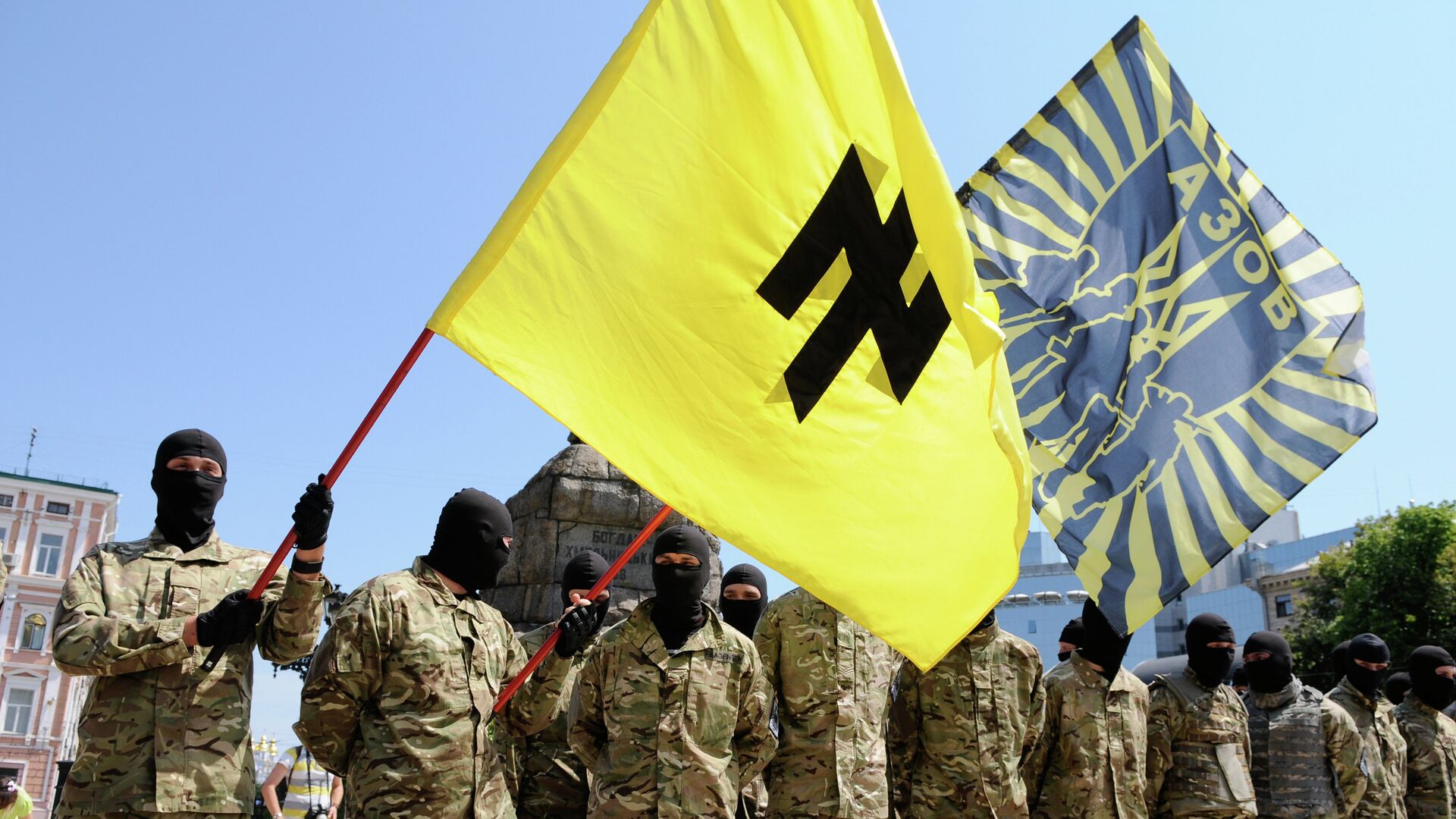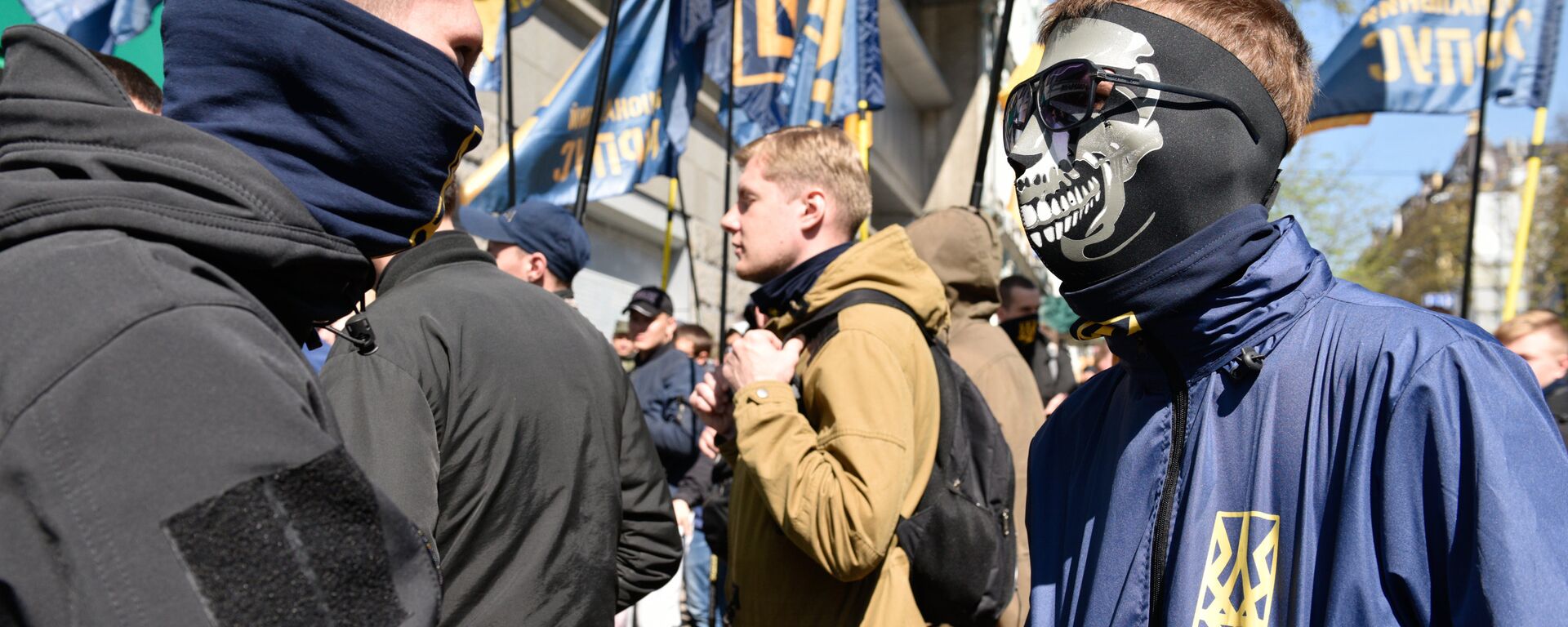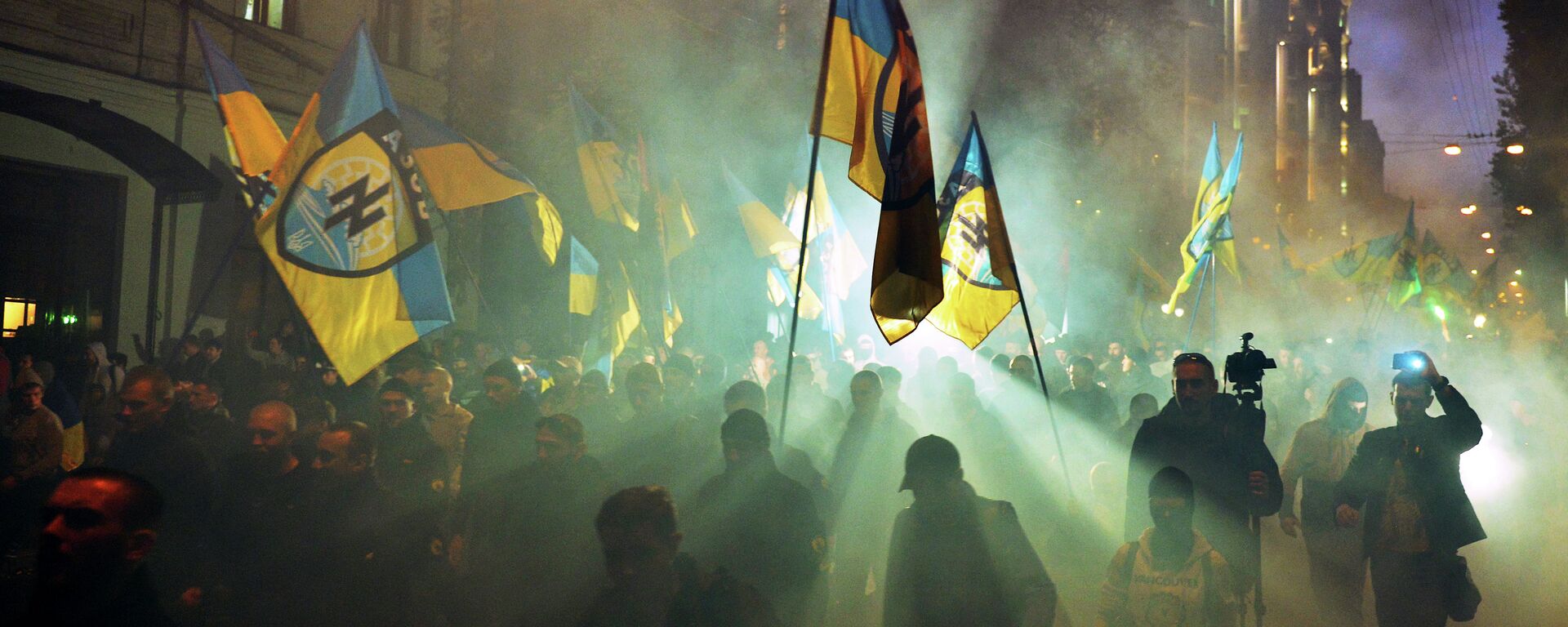https://sputnikglobe.com/20220409/tokyo-apologises-to-azov-neo-nazis-removes-them-from-designated-terrorists-list-1094619140.html
Tokyo Apologises to Azov Neo-Nazis, Removes Them From Designated Terrorists List
Tokyo Apologises to Azov Neo-Nazis, Removes Them From Designated Terrorists List
Sputnik International
The Azov Regiment, an openly neo-Nazi unit operating within Ukraine’s National Guard that uses Swastika-style runic insignia, is accused of being complicit in... 09.04.2022, Sputnik International
2022-04-09T13:58+0000
2022-04-09T13:58+0000
2022-10-19T20:58+0000
russia's special operation in ukraine
azov battalion
japan
russia
donetsk people's republic
lugansk people’s republic
ukraine
https://cdn1.img.sputnikglobe.com/img/102088/79/1020887924_0:0:3000:1688_1920x0_80_0_0_4322f233e53d82a83ae8458529190bfb.jpg
Japan’s Public Security Intelligence Agency (PSIA) has excluded the Azov Regiment, a component of the Ukrainian military notorious for openly neo-Nazi leanings and war crimes including murder, torture and mass looting, from its International Terrorism Handbook 2021.It went on to explain that the "International Terrorism Handbook 2021" is based on a compilation of public information, published by various domestic and foreign media, research institutions, etc. Accordingly, it does not include the “independent evaluation” of the Public Security Intelligence Agency, tasked with assessing internal security and espionage threats to Japanese national security to determine if there is a justification to clamp down on an organization's activities.“The Public Security Intelligence Agency has not recognized the "Azov Battalion" as a neo-Nazi organization,” added the PSIA, justifying its move to delete the designation from the "International Terrorism Handbook 2021."The Azov Battalion, formed as a volunteer militia in the spring of 2014 and integrated into the Ukrainian National Guard in the fall of that year, is one of the most notorious fighting units in the country.Azov, which uses banners and chevrons featuring Swastika-style symbols, including the wolfsangel insignia associated with the Nazi SS, includes Ukrainian fighters who openly adhere to racist and neo-Nazi views, as well as mercenaries from other countries.Since 2014, when Ukraine's government was overthrown in a coup, Azov fighters have been participating in Kiev’s military operation in the Donbass area, targeting the predominantly Russian-speaking citizens of the two breakaways - Donetsk and Lugansk People’s Republics (DPR and LPR) - throughout an eight-year offensive.In Russia, a criminal case has been opened against the battalion’s fighters under the articles "Kidnapping", "Torture" and "Use of Prohibited Means and Methods of Warfare". The US Congress formally prohibited funding to Azov and called it a neo-Nazi group in 2017.After the two republics were formally recognized by Russia earlier this year, Moscow launched a special operation to demilitarize and de-Nazify Ukraine on 24 February in response to an appeal for help from DPR and LPR amid escalating attacks by Kiev.The Russian Defence Ministry repeatedly stressed that Moscow had no plans to occupy the country, with the operation exclusively targeting Kiev’s military infrastructure.Currently, remnants of the Azov battalion are blocked in Mariupol, where the joint Russian military-Donetsk People's Militia operation is underway to free the Azov Sea-adjacent city.The Ukrainian military and Neo-Nazi Azov units have set up defences inside the city, using civilians hostage and mining residential buildings.
https://sputnikglobe.com/20220407/russian-investigative-committee-has-evidence-on-azov-commanders-attempts-to-kill-8-russian-troops-1094548050.html
https://sputnikglobe.com/20220407/absolute-humiliation-greek-lawmakers-incensed-over-zelensky-speech-alongside-neo-nazi-fighters-1094561894.html
japan
ukraine
Sputnik International
feedback@sputniknews.com
+74956456601
MIA „Rossiya Segodnya“
2022
News
en_EN
Sputnik International
feedback@sputniknews.com
+74956456601
MIA „Rossiya Segodnya“
Sputnik International
feedback@sputniknews.com
+74956456601
MIA „Rossiya Segodnya“
azov battalion, japan, donetsk people's republic, lugansk people’s republic, ukraine
azov battalion, japan, donetsk people's republic, lugansk people’s republic, ukraine
Tokyo Apologises to Azov Neo-Nazis, Removes Them From Designated Terrorists List
13:58 GMT 09.04.2022 (Updated: 20:58 GMT 19.10.2022) The Azov Regiment, an openly neo-Nazi unit operating within Ukraine’s National Guard that uses Swastika-style runic insignia, is accused of being complicit in crimes committed in Donbass, Eastern Ukraine, by the Investigative Committee of the Russian Federation. The US Congress formally prohibited funding to the “Neo-Nazi group Azov” in 2017.
Japan’s Public Security Intelligence Agency (PSIA) has
excluded the Azov Regiment, a component of the Ukrainian military notorious for openly neo-Nazi leanings and war crimes including murder, torture and mass looting, from its International Terrorism Handbook 2021.
“Recently, there have been cases when essentially false information was disseminated, alleging that the Public Security Intelligence Agency recognizes the "Azov Battalion" as a neo-Nazi organization. We regret the occurrence of such incidents,”
stated the PSIA website.
It went on
to explain that the "International Terrorism Handbook 2021" is based on a compilation of public information, published by various domestic and foreign media, research institutions, etc. Accordingly, it does not include the “independent evaluation” of the Public Security Intelligence Agency, tasked with assessing internal security and espionage threats to Japanese national security to determine if there is a justification to clamp down on an organization's activities.
“The Public Security Intelligence Agency has not recognized the "Azov Battalion" as a neo-Nazi organization,” added the PSIA, justifying its move to delete the designation from the "International Terrorism Handbook 2021."
The Azov Battalion, formed as a volunteer militia in the spring of 2014 and integrated into the Ukrainian National Guard in the fall of that year, is one of the most notorious fighting units in the country.
Azov, which uses banners and chevrons featuring Swastika-style symbols, including the wolfsangel insignia associated with the Nazi SS, includes Ukrainian fighters who openly adhere to racist and
neo-Nazi views, as well as mercenaries from other countries.
Since 2014, when Ukraine's government was overthrown in a coup, Azov fighters have been participating in Kiev’s military operation in the Donbass area, targeting the predominantly Russian-speaking citizens of the two breakaways - Donetsk and Lugansk People’s Republics (DPR and LPR) - throughout an eight-year offensive.
In Russia, a criminal case has been opened against the battalion’s fighters under the articles "Kidnapping", "Torture" and "Use of Prohibited Means and Methods of Warfare". The US Congress formally prohibited funding to Azov and called it a neo-Nazi group in 2017.
After the two republics were formally recognized by Russia earlier this year, Moscow launched a special operation
to demilitarize and de-Nazify Ukraine on 24 February in response to an appeal for help from DPR and LPR amid escalating attacks by Kiev.
The Russian Defence Ministry repeatedly stressed that Moscow had no plans to occupy the country, with the operation exclusively targeting Kiev’s military infrastructure.
Currently, remnants of the Azov battalion are blocked in Mariupol, where the joint Russian military-Donetsk People's Militia operation is underway to free the Azov Sea-adjacent city.
The Ukrainian military and Neo-Nazi
Azov units have set up defences inside the city, using civilians hostage and mining residential buildings.




